A Guide on How to Manage Your Business’s Online Reputation
November 28, 2023
Rudra Kumar
What has changed from the original post:
1. Additional content for the ‘Intro’ section
2. Added ‘Connection between ORM and SEO’ section
3. Added ‘Effective ORM media channels’ section
4. Added the ‘Why ORM is important for your business?’ section
5. Added Best Tools for Online Reputation Management section
Summary: A comprehensive guide for online reputation management. Its importance and the strategies to develop a robust ORM plan.
What is online reputation management?
Online brand reputation management is similar to having your own personal public relations (PR) representative on the Internet. Consider your brand to be a person at a large party (the internet), where everyone is talking about it. Ensuring such interactions are good and showing your brand in the best light is what reputation management is all about.
So it’s not only about having a great website or a strong social media presence; it’s also about actively molding what people say and think about your business online. This includes checking social media, reviews, and any other place on the internet where people may be discussing you.
Consider it like being up to date on the newest brand rumors. Fantastic if someone is singing your praises! However, if there is any negative information floating about, reputation management can help you address it, possibly conduct some damage control, and guide the discourse back to the positive.
ORM (online brand reputation management) is the practice of monitoring, influencing, and regulating an organization’s or individual’s online reputation. Because of the increasing use of the internet and social media, information about businesses and persons may travel quickly, necessitating the active management of businesses’ online presence.
Key components of a robust reputation management strategy include:
Monitoring
- Tracking online mentions of the brand or individual across various platforms, including social media, review sites, news articles, and forums.
- Setting up alerts and notifications to be aware of any new mentions or discussions related to the brand.
Analysis
- Evaluating the sentiment of online mentions to understand how people perceive the brand.
Identifying trends and patterns in online conversations that may impact the brand’s reputation.
- Engagement
Engagement
- Actively participating in online conversations by responding to comments, reviews, and inquiries.
- Addressing customer concerns and resolving issues promptly to demonstrate a commitment to customer satisfaction.
Content management
- Creating and promoting positive content about the brand to overshadow any negative information.
- Developing a content strategy that aligns with the brand’s values and resonates with the target audience.
Review management
- Monitoring and responding to online reviews on platforms such as Yelp, Google Reviews, and other industry-specific review sites.
- Encouraging satisfied customers to leave positive reviews to counterbalance any negative feedback.
Social media management
- Managing social media profiles to maintain a consistent brand image.
- Addressing customer feedback and inquiries on social media platforms.
Search engine optimization (SEO)
- Optimizing online content to ensure positive and relevant information about the brand appears prominently in search engine results.
- Suppressing or countering negative content through SEO strategies.
Additional Read: What is SEO
Crisis management
- Developing a plan for addressing and managing crises that may arise online, such as negative publicity or a social media backlash.
- Responding to crises in a timely and strategic manner to mitigate potential damage to the brand’s reputation.
How does online reputation impact your line of work? What do you stand to benefit from employing the services of online reputation management?
At Techmagnate, we believe that every field can see major growth in their sales and reviews by improving and monitoring their online reputation. Here are just a few examples of the many kinds of businesses we help with this every day:
Why ORM is important for your business?
Online Reputation Management (ORM) is like the guardian angel of your business in the digital realm. Here’s why it’s crucial:
- First impression matters
In today’s digital world, many people’s initial engagement with your company is through an internet search. ORM guarantees that people’s first impressions of your brand are favorable by regulating what they see in search results and on social media.
- Customer trust and credibility
People believe what they read on the internet. A positive internet reputation for your brand fosters trust and credibility. Customer testimonials, reviews, and favorable remarks all add to the general impression of your company.
- Influence purchase decisions
Consumers frequently conduct research on products or services before making a purchase. A good internet reputation impacts their decision-making. They are more inclined to pick your company over rivals if they discover favorable reviews, testimonials, and an overall positive image.
- Competitive advantage
A solid internet reputation distinguishes you from the competitors. You get a competitive advantage if potential buyers notice that your brand has a solid reputation while others have problems. In a saturated market, it’s a differentiator.
- Employee recruitment and retention
Top talent is attracted by a positive employer brand, which is part of ORM. Before opting to work for a firm, potential workers frequently read evaluations on employment sites such as Glassdoor. Creating a nice work atmosphere on the Internet aids in employee recruitment and retention.
- Customer retention
Existing clients are more inclined to discuss their online experiences. By actively maintaining your online reputation, you may respond to client problems quickly and demonstrate that you respect their input. This helps to increase client happiness and retention.
- Search engine visibility
When ranking webpages, search engines take into account internet sentiment. Positive articles, reviews, and mentions may increase your search engine exposure and make it simpler for potential consumers to locate your company.
- Crisis prevention and management
ORM is about controlling and reducing unfavorable events as well as keeping a positive image. Having a robust ORM plan in place helps you to respond effectively and minimize damage in the case of a crisis or unwanted press.
- Social media influence
Social media is an extremely effective instrument for both good and bad PR. ORM guarantees that your social media platforms favorably represent your business, establishing a community in which customers feel involved and appreciated.
- Long-term brand building
ORM is an investment in your brand’s long-term success. Building and maintaining a strong online reputation increases brand equity, making your company more robust to market difficulties and swings.
Online reputation management for doctors
 Image Source: digitalismedical.com
Image Source: digitalismedical.com
Now more than ever
reputation management for physicians is a major factor in determining the continued business a clinic or practice will see. People want to know what others think and have experienced in dealing with their potential healthcare providers. This is why there are entire websites devoted to the online reputation of doctors – and why, if you’re a physician, you need to have someone keeping an eye on yours.
Reputation management for dentists, surgeons, pediatricians, and many other types of healthcare providers encompasses monitoring these sites, local reviews, and more, to give you the clearest picture of how your practice is being perceived online. Through regular monitoring, you can address common complaints or outlying issues and ensure happier patients – and more referrals in the future.
Online reputation management for politicians
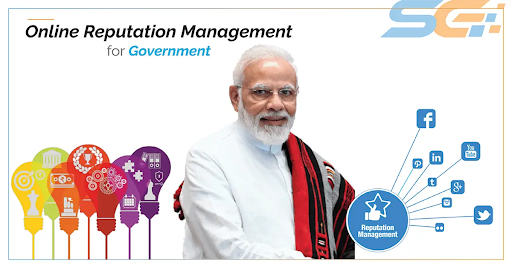 Image Source: sachingupta.in
Image Source: sachingupta.in
Perhaps no line of work is more dependent on public opinion than that of politics. With online reputation management, politicians can see real-time feedback on what people are saying, sharing, and talking about regarding both their own campaign and the relevant issues that impact it. With this feedback, changes can be made and statements can be issued to reinforce the faith of voters and sway those who are still on the fence.
What’s more, currently-seated politicians can use this monitoring to meet the needs of those they represent, ensuring better outcomes in voter satisfaction during their terms.
Online reputation management for lawyers
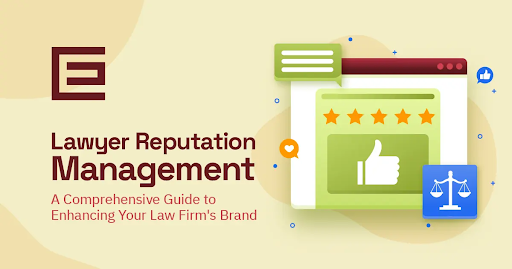 Image Source: theedigital
Image Source: theedigital
Lawyers already struggle with an unfortunate stigma in the court of public opinion. Many people perceive legal professionals as being less than trustworthy. While this reputation is often unfairly awarded, it can be made even more unfair when people spread untrue information online.
Protect your legal practice and bolster your positive public reputation. Consult an online reputation management professional for assistance with keeping things lit in a positive light in the public eye. Your caseload will grow along with your good reputation.
Online reputation management for real estate agents and firms
 Image Source: birdeye.com
Image Source: birdeye.com
Real estate agents rely very heavily on the public perception of both their firm and their own personal ability to find the right properties for buyers at the right price. With so many of today’s home buyers now shopping online, it’s imperative for the modern real estate agent to have a solid online presence – and to have a sterling reputation amongst consumers turning to real estate websites for guidance.
Reputation management for real estate helps agents and the companies they sell for be ready when their next buyer reaches out by giving them the confidence they need to hand over a business card or pass along an email address knowing the information associated with their name will be positive.
Online reputation management for restaurants
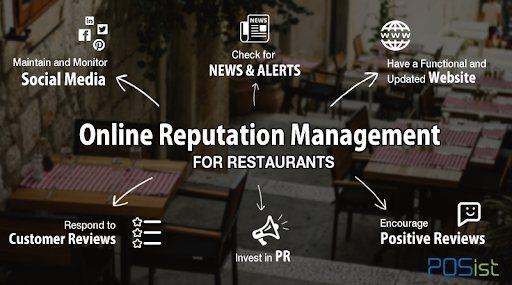 Image Source: posist.com
Image Source: posist.com
These days, people use a variety of apps and websites to find restaurants to frequent in their own hometowns and in the cities they are visiting. This makes the online reputation of these restaurants just as important – if not more so – than the “word around town”.
Having online reputation management for restaurants at your disposal means that you’ll be able to keep an eye on what people are buying and what they’re saying about your establishment, and address any necessary concerns. That way, when hungry customers go looking for information about your eatery online, what they’ll find will be nothing but encouragement to give your place a try.
Online reputation management for small businesses
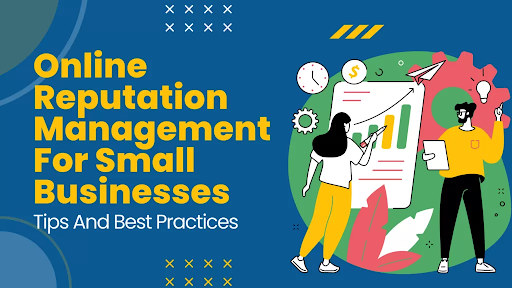 Image Source: konnectinsights.com
Image Source: konnectinsights.com
Perhaps nowhere is a positive online reputation more important than in the case of small, local businesses. These companies are already at a disadvantage to larger businesses in their same field; dealing with negative feedback or false information being spread online impacts them at a much greater level than a bigger brand would deal with.
Reputation management for car dealers, dry cleaners, hair stylists, and many other small business owners can help make a positive impact on these proprietors and their businesses.
By monitoring everything from reviews on local forums to information shared on social media, online reputation management services can mean the difference between mediocre sales and profits and those that catapult small businesses into the world of franchising and more.
For more information on how your business can benefit from online reputation management, contact us. We’ll show you just how important monitoring this information can be to maintain and grow your customer base and help you keep those customers coming back!
Additional Read: SEO For Branding: How to Use SEO to Build Brand Awareness
Connection between ORM and SEO
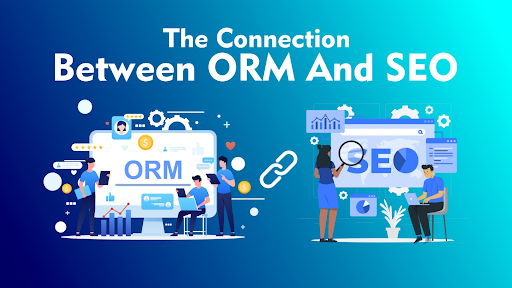 Image Source: indidigital.com
Image Source: indidigital.com
ORM (Online Reputation Management) and
SEO (Search Engine Optimization) are the dynamic pair for your brand’s online visibility! Let’s dissect their tag-team relationship.
To begin, SEO is all about ensuring that your website appears high in search engine rankings. The stronger your SEO game, the more probable it is that people will find you while looking for something connected to your business. Here’s where ORM comes in with its cape: your online reputation has a direct influence on your SEO.
Quality content rules both ways
SEO appreciates new, relevant, and high-quality material. ORM promotes positive, engaging material that enhances your brand’s image. When you create content that people like, share, and discuss, you not only improve your SEO by signaling to search engines that your site is worthwhile, but you also improve your whole online reputation.
Link building is the key
When it comes to link building, SEO and ORM go hand in hand. Backlinks from reliable websites are an SEO goldmine. ORM assists you in gaining such linkages by cultivating beneficial relationships and partnerships. A positive online reputation encourages other websites to connect to your material, providing your SEO a boost.
Keyword research
ORM can have an impact on the keywords linked with your brand. It’s a win-win situation if people use positive, relevant phrases while talking about you. These keywords should then be implemented into your overall SEO strategy, thus assisting you in ranking better for phrases that fit with the good image of your business.
User experience
Both SEO and ORM are focused on customer experience. Users will remain longer if your site is easy to browse, loads quickly, and has useful information. Positive online attitudes can help to improve the user experience. When people are satisfied, search engines notice, and it benefits your SEO.
Social signals sync
Social media plays an important role in both SEO and ORM. Search engines incorporate social signals such as shares, likes, and comments when ranking pages. ORM entails actively monitoring your social media presence, ensuring that good social signals are sent into the digital cosmos, hence boosting your SEO.
Effective ORM media channels
Online Reputation Management (ORM) entails monitoring what people are saying about your company on numerous internet platforms and actively managing your brand image. Here are some main media platforms where ORM is important:
- Social media
Facebook, Twitter, Instagram, LinkedIn, and other social media platforms are hubs for conversations and interactions. ORM is tracking brand mentions, replying to comments, and actively interacting with your target audience in order to cultivate a good image.
Additional Read: Social Media Marketing: A Step by Step Guide
- Review sites
Customer reviews on sites like Yelp, Google Reviews, TripAdvisor, and others may make or destroy a brand. ORM includes managing and responding to reviews, correcting complaints, and highlighting good feedback in order to establish a reputation.
- Search engines
Google, Bing, Yahoo, and other search engine results can have a significant impact on perception. ORM tactics frequently incorporate content optimization to guarantee positive and relevant material ranks high while pushing down any bad content.
- News outlets and blogs
News stories and blog postings can have an influence on the reputation of your brand. ORM entails keeping an eye on these sources, correcting any mistakes, and attempting to create a favorable online narrative.
- Forums and communities
People often discuss brands in numerous online communities, such as Reddit, Quora, and industry-specific forums. Participating in pertinent debates, resolving complaints, and establishing a positive presence within these groups are all examples of ORM.
- Video platforms
YouTube, Vimeo, and other video platforms can influence people’s attitudes. ORM includes monitoring and responding to comments on your videos, as well as addressing any films from others that may have an influence on the reputation of your company.
Additional Read: Top 10 Video Marketing Strategies For Lead Generation
- Customer service channels
Direct communication channels are vital for a robust ORM strategy. Customer service channels that are timely and friendly lead to a positive internet reputation.
- Employee reviews and job sites
Glassdoor, Indeed, and other similar sites: Employee experiences can influence how the general public sees your brand. ORM includes tracking employee reviews and addressing any issues that arise in order to maintain a strong employer brand.
- Business directories
ORM entails ensuring that your business information is correct and favorable throughout various directories, as they frequently contribute to search engine rankings.
- Owned media
Your company’s website, blog, and social media pages are critical. ORM includes developing and promoting positive material on your owned media, highlighting accomplishments, and responding to any concerns voiced by your audience.
Online reputation management for dentists, surgeons, paediatricians, and many other types of healthcare providers is an important part of digital marketing services for healthcare professionals.
Now more than ever, reputation management for physicians is a major factor in determining the continued business a clinic or practice will see. People want to know what others think and have experienced in dealing with their potential healthcare providers.
This is why there are entire websites devoted to the online reputation of doctors – and why, if you’re a physician, you need to have someone keeping an eye on yours.
Best Tools for Online Reputation Management
Individuals and corporations must monitor, influence, and manage their online reputations through Online Reputation Management (ORM). There are several tools available to help achieve this task. Here are some of the best tools for managing your online reputation.
- Google Alerts
Google Alerts is a free tool that sends email alerts anytime new content matching certain keywords arrives in Google’s search results. It’s an easy approach to keep track of brand or name mentions.
- BrandYourself
BrandYourself is an all-in-one platform that assists people and companies in managing their internet reputation. It provides tools for tracking search results, enhancing online profiles, and optimizing content for increased search visibility.
- Reputation.com
Reputation.com is a powerful platform that helps businesses manage customer reviews, social media mentions, and other elements of their online reputation. It also provides insights and data to help you better understand reputation patterns.
- Hootsuite
Hootsuite is primarily a social media management tool, but it can also be beneficial for ORM since it allows users to monitor social media mentions and communicate with their audience across many platforms from a single dashboard.
- Social Mention
Social Mention is a social media search and analysis tool that operates in real-time, collecting user-generated information from numerous platforms and analyzing it to provide insights into brand mentions, sentiment, and impact.
- Mention
Mention is a comprehensive social media monitoring tool that assists in tracking brand mentions throughout the Internet, including social media, news sites, blogs, and forums. It offers real-time notifications as well as sentiment analysis.
- Yotpo
Yotpo is primarily concerned with maintaining and leveraging consumer reviews. It enables businesses to gather and display client feedback on their websites, as well as reply to feedback and obtain insights into customer opinion.
- Brandwatch
Brandwatch is a social listening and analytics solution for organizations that allows them to monitor brand mentions, measure social media sentiment, and evaluate trends. It gives you detailed insights into Internet talks regarding your brand.
- SEMrush
While SEMrush is best recognized as an SEO tool, it also has brand monitoring functions. Users can monitor online visibility, track mentions, and evaluate backlinks, giving a comprehensive approach to online reputation management.
- Talkwalker
Talkwalker is a social media analytics and monitoring platform that delivers brand mention data, sentiment analysis, and competition benchmarking. It also covers a wide variety of web channels.
- Reputology
Reputology is a review, monitoring, and management tool that assists organizations in tracking and responding to online reviews across several platforms. It’s especially handy for companies with several locations.
Consider the unique demands of your business or personal brand, the platforms you want to monitor, and the features that fit with your aims when selecting an ORM solution. For a thorough Online Reputation Management approach, it is generally advantageous to employ a combination of solutions.